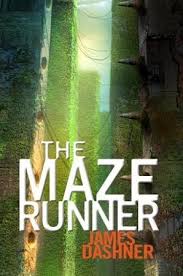
The Maze Runner
Chapter 62
by Dashner, JamesIn Chapter 62 of *The Maze Runner*, Thomas and the surviving Gladers settle into their new sleeping arrangements, with Thomas bunking alongside Minho, Newt, and Frypan. Teresa is separated from the group, leaving Thomas feeling her absence acutely. As Thomas tries to rest, Minho initiates a conversation, questioning the fate of the Gladers who remained in the Maze. Thomas responds grimly, imagining the Grievers overrunning them, though his tone remains detached. The exchange highlights the lingering trauma and guilt they carry from their harrowing escape.
Minho then voices his doubts about their safety with their new hosts, to which Thomas reassures him, though his confidence feels more like a desperate hope than certainty. Exhausted, Thomas reflects on his time in the Maze, which now feels distant and surreal. Around him, murmurs of conversation fade as he struggles to stay awake, yearning to connect with Teresa. Their telepathic exchange reveals their shared grief over Chuck’s death, with Teresa offering comfort by reminding Thomas that Chuck’s sacrifice was his own choice.
Thomas’s grief and guilt over Chuck’s death weigh heavily on him, and he confesses to Teresa that he would trade any of the surviving Gladers to have Chuck back. Teresa urges him not to dwell on unfulfilled promises but to honor Chuck’s sacrifice. Their conversation shifts to their desire to remember their past connection, though neither can articulate it fully. The emotional exchange ends with a tentative hope for the future, even as uncertainty looms over what tomorrow will bring.
As the lights go out, Thomas is left alone with his thoughts, his face settling into an expression that is not quite a smile but carries a semblance of peace. The chapter closes on this fragile moment of almost-happiness, underscoring the resilience of the characters amid their trauma. The interactions and reflections in this chapter emphasize themes of loss, guilt, and the struggle to find solace in the aftermath of tragedy, while hinting at the unresolved questions about their new circumstances.
FAQs
1. How does Thomas feel about Teresa’s absence, and how does their telepathic conversation reveal their emotional connection?
Answer:
Thomas feels an immediate sense of loss when Teresa is taken to a separate room, missing her “desperately three seconds after she was gone.” Their telepathic exchange reveals a deep emotional bond, as they share jokes, grief over Chuck’s death, and mutual longing to remember their past connection. Teresa comforts Thomas about Chuck’s sacrifice, showing her understanding of his pain. Their conversation ends with a shared hope for the future, highlighting their reliance on each other for emotional support. The chapter underscores their unique relationship, blending vulnerability, humor, and unresolved feelings.2. What does Minho’s question about the Gladers who stayed behind reveal about the group’s current psychological state?
Answer:
Minho’s question reflects the group’s lingering trauma and survivor’s guilt. Despite their physical safety, they remain haunted by the fate of those left in the Maze, suggesting unresolved fear and moral unease. Thomas’s blunt response—that the remaining Gladers are likely dead—shows his desensitization to violence, a coping mechanism developed through repeated trauma. The exchange underscores the psychological toll of their escape: even in safety, they grapple with loss, uncertainty, and the cost of their survival.3. Analyze how Thomas’s reflection on Chuck’s death reveals his internal conflict. How does Teresa’s response shape his perspective?
Answer:
Thomas’s grief over Chuck is raw and guilt-ridden; he recalls Chuck’s annoying but endearing traits, calling the loss “like I lost a brother.” His fixation on his failed promise to protect Chuck shows his tendency toward self-blame. Teresa reframes Chuck’s death as a purposeful sacrifice, urging Thomas not to “waste it.” This shifts Thomas from guilt to a tentative acceptance, though his tears reveal unresolved pain. The dialogue highlights Teresa’s role in grounding Thomas, steering him toward honoring Chuck’s choice rather than drowning in regret.4. How does the chapter’s ending—Thomas’s “almost” smile—symbolize his emotional arc?
Answer:
The “almost” smile captures Thomas’s fragile hope amid grief. It’s not joy but a quiet acknowledgment of resilience, tempered by loss (Chuck) and longing (Teresa). The expression reflects his transition from despair to cautious optimism, mirroring the chapter’s themes of survival and connection. The darkness hiding his face underscores his need to process emotions privately, while “almost was good enough” suggests he’s learning to accept imperfect solace. This moment encapsulates his complex emotional journey: wounded but enduring, isolated yet tethered to others.
Quotes
1. “He couldn’t believe how nonchalant his voice sounded as he said it.”
This quote captures Thomas’s emotional detachment when discussing the likely fate of the Gladers left behind, showing how trauma has numbed his reactions to death and danger—a recurring theme in the chapter.
2. “He died saving you… Just don’t ever waste it.”
Teresa’s powerful statement about Chuck’s sacrifice represents the chapter’s central theme of survivor’s guilt and the moral obligation to honor those who died by making their deaths meaningful.
3. “I wanna remember you. Remember us. Ya know, before.”
This vulnerable exchange between Thomas and Teresa highlights their shared longing for lost memories and identity, a key emotional throughline in the chapter as they grapple with their mysterious past.
4. “It wasn’t a smile, exactly. Not quite a happy expression. But almost. And for now, almost was good enough.”
The chapter’s closing lines poignantly show Thomas finding fragile hope amid grief, capturing the bittersweet tone of survival after trauma—a significant emotional progression from earlier despair.
